- Home
- Haruki Murakami
The Elephant Vanishes: Stories Page 3
The Elephant Vanishes: Stories Read online
Page 3
“Stamp that out for me? I got bare feet.”
I conscientiously grind it out under the sole of my tennis shoe.
“That cat, I think I just may have seen it,” she phrases guardedly. “I didn’t get as far as noticing the tip of its tail, but yes, there was a brown tom. Big, probably wearing a collar.”
“When did you see it?”
“Yeah, when was that? I’m sure I must’ve seen it lots of times. I’m out here in the yard nearly every day sunbathing, so one day just blends into the rest. But anyway, it’d have to be within the last three or four days. The yard’s a cat shortcut, all kinds of cats scooting through all the time. They come out of the Suzukis’ hedge there, cut across our yard, and head into the Miyawakis’ yard.”
So saying, she points over at the vacant house. Same as ever, there’s the stone bird with outspread wings, goldenrod basking in the spring rays, pigeon cooing away on the TV aerial.
“Thanks for the tip,” I tell her.
“Hey, I’ve got it, why not come into the yard here and wait? All the cats pass this way anyhow. And besides, if you keep snooping around over there, somebody’s going to mistake you for a burglar and call the cops. Wouldn’t be the first time.”
“But I can’t just hang around waiting for a cat in somebody else’s yard.”
“Sure you can, like, it’s no big deal. Nobody’s home and it’s dead boring without someone to talk to. Why don’t we just get some sun, the two of us, until the cat shows up? I’ve got sharp eyes, I’d be a real help.”
I look at my watch. Two thirty-six. All I’ve got left to do today is take in the laundry and fix dinner.
“Well, okay, I’ll stay until three o’clock,” I say, still not really grasping the situation.
I open the gate and step in, following the girl across the grass, and only then do I notice that she’s dragging her left leg slightly. Her tiny shoulders sway with the periodic rhythm of a crank grinding mechanically to the left. She stops a few steps ahead of me and signals for me to walk alongside her.
“Had an accident last month,” the girl says simply. “Was riding on the back of someone’s bike and got thrown off. No luck.”
Two canvas deck chairs are set out in the middle of the grass. A big blue towel is draped over the back of one chair, and the other is occupied by a red Marlboro box, an ashtray, and a lighter tossed together with a large radio-cassette player and some magazines. The volume is on low, but some unidentifiable hard-rock group is playing.
She removes the clutter to the grass and asks me to sit down, switching off the music. No sooner am I seated than I get a clear view of the passage and the vacant house beyond. I can even see the white stone bird figurine and the goldenrod and the chain link fence. I bet she’s been watching me from here the whole time.
The yard is large and unpretentious. The grass sweeps down a gentle slope, graced here and there with plants. To the left of the deck chairs is a sizable concrete pond, which obviously hasn’t seen much use of late. Drained of water, it presents a greenish, discolored bottom to the sun, like some overturned aquatic creature. The elegant beveled façade of an old Western-style house, neither particularly large nor all that luxurious, poses behind a stand of trees to the rear. Only the yard is of any scale or shows any real upkeep.
“Once, I used to part-time for a lawn-mowing service,” I say.
“Oh yeah?” says the girl without much interest.
“Must be hard work maintaining a yard this big,” I comment, looking around me.
“Don’t you have a yard?”
“Just a little yard. Two, three hydrangeas, that’s about the size of it,” I say. “You alone here all the time?”
“Yeah, you said it. Daytime, I’m always alone. Mornings and evenings, a maid comes around, though otherwise I’m alone. Say, how about a cold drink? There’s even beer.”
“No, I’m fine.”
“Really? Like, it’s no big deal.”
“I’m not thirsty,” I say. “Don’t you go to school?”
“Don’t you go to work?”
“No work to go to,” I admit.
“Unemployed?”
“Kind of. I quit.”
“What sort of work were you doing?”
“Lawyer’s gofer,” I equivocate, taking a slow, deep breath to cut the talk. “Collecting papers from city-hall and government offices, filing materials, checking case precedents, taking care of court procedures, busy work like that.”
“But you quit?”
“Correct.”
“Your wife work?”
“She does,” I say.
I take out a cigarette and put it to my mouth, strike a match, and light up. The wind-up bird screeches from a nearby tree. A good twelve or thirteen turns of the watch spring, then it flits off to another tree.
“Cats are always going past there,” the girl remarks apropos of nothing, pointing over at the edge of the grass in front. “See that incinerator behind the Suzukis’ hedge? Well, they come out from right next to it, run all the way across, duck under the gate, and make for the yard over there. Always the same route. Say, you know Mr. Suzuki? College professor, on TV half the time?”
“Mr. Suzuki?”
She goes on in some detail, but it turns out that I don’t know our Mr. Suzuki.
“I hardly ever watch TV,” I say.
“Horrible family,” the girl sneers. “Stuck-up, the whole lot of them. TV people are all a bunch of phonies.”
“Oh?”
The girl picks up her Marlboros, takes one out, and rolls it around unlit between her fingers.
“Well, I suppose there’s decent folk among them, but they’re not my type. Now, the Miyawakis, they were okay people. Mrs. Miyawaki was nice. And Mr. Miyawaki, he ran two or three family restaurants.”
“What happened to them?”
“Don’t know,” said the girl, flicking the end of her cigarette. “Probably owed money. There was a real commotion when they left. Been gone two years now, I guess. Dropped everything and just left. The cats just keep multiplying, no consideration. Mom’s always complaining.”
“Are there that many cats?”
She puts the cigarette to her lips and lights up with her lighter. Then nods.
“All kinds of cats. Some losing their fur, even a one-eyed cat … big lump of flesh where the eye was. Gross, huh?”
“Gross,” I concur.
“I’ve got a cousin with six fingers. A girl, little older than me, has this baby pinkie right beside her little finger. Always keeps it neatly folded under, so you can barely tell. A real pretty girl.”
“Hmm,” I say.
“You think stuff like that’s hereditary? Like, you know … runs in the blood?”
“I couldn’t tell you,” I say.
The girl says nothing for the moment. I smoke my cigarette and train my eyes on the cat path. Not a single cat has shown the whole time.
“Hey, you sure you won’t drink something? I’m going to have a cola,” says the girl.
“No thanks,” I tell her.
The girl gets up from her deck chair and disappears into the shade, dragging her leg; meanwhile, I pick up one of the magazines lying by my feet and flip through the pages. Contrary to what I’d expected, it’s a men’s monthly. The center spread has a woman sitting in an unnatural pose, legs wide apart, so that you can see her genitals and pubic hair through a sheer body stocking. Never a dull moment, I think, and put the magazine back where I found it, then redirect my gaze toward the cat path, arms folded across my chest.
After what seems like ages, the girl returns, glass of cola in hand. She’s shed her Adidas T-shirt for a bikini top with her shorts. It’s a small bra that shows off the full shape of her breasts, with tie-strings in back.
For sure, it’s one hot afternoon. Just lying there in the sun on the deck chair, my gray T-shirt is blotched dark with sweat.
“Tell me,” the girl picks up where she left off, “suppose you found out
the girl you liked had a sixth finger, what would you do?”
“I’d sell her to the circus,” I say.
“Really?”
“Just kidding,” I come back, startled. “I probably wouldn’t mind.”
“Even if there’s the possibility of passing it on to your kids?”
I give it some thought.
“I don’t think I’d mind. One finger too many’s no great harm.”
“What about if she had four breasts?”
I think it over a while.
“I don’t know,” I say.
Four breasts? This conversation’s going nowhere fast, so I decide to change the subject.
“How old are you?”
“Sixteen,” the girl answers. “Just turned sixteen. Freshman in high school.”
“But you’re taking time off from school.”
“Can’t walk too much before my leg starts to hurt. Got a gash right by my eye, too. It’s a pretty straight school, no telling what kind of trouble I’d be in if they found out I hurt myself falling off a bike … which is why I’m out sick. I can take a whole year off if I want. I’m in no big hurry to graduate from high school.”
“Hmm” is all I can say.
“But anyway, back to what we were talking about, you said you thought it was okay to marry a girl with six fingers, but four breasts turned you off.”
“I didn’t say it turned me off, I just said I didn’t know.”
“Why don’t you know?”
“I can’t quite picture it.”
“But you can picture a sixth finger.”
“Sort of.”
“What’s the difference? Six fingers or four breasts?”
Once again, I give the matter some thought, but can’t begin to think of how to explain.
“Tell me, do I ask too many questions?” the girl asks, peering into my eyes from behind her sunglasses.
“You been told that?” I ask back.
“Sometimes.”
“Nothing wrong with asking questions. Makes the other person think.”
“Most people, though, don’t give me much thought,” she says, looking at the tips of her toes. “Everyone just gives the usual nothing-doing answers.”
I shake my head vaguely and to realign my gaze onto the cat path. What the hell am I doing here? There hasn’t been one lousy cat come past here yet.
I shut my eyes for twenty or thirty seconds, arms folded across my chest. Lying there, eyes closed, I can feel the sweat bead up over different parts of my body. On my forehead, under my nose, around my neck, the slightest sensations, as if tiny moistened feathers had been floated into place here and there. My T-shirt clings to my chest like a drooping flag on a doldrum day. The sunlight has a curious weight as it seeps into me. I can hear the tinkling of ice as the girl jiggles her glass.
“Go to sleep if you want. I’ll wake you if I see your cat,” the girl whispers.
I nod silently with eyes closed.
For the time being, there isn’t a sound. That pigeon and the wind-up bird must have gone off somewhere. Not a breeze, not even a car starting. The whole while I’m thinking about that voice on the telephone. What if I really did know the woman?
Yet I can’t recall any such woman. She’s just not there; she’s long departed from my consciousness. Only her long, long shadow trailing across my path, a vision from Chirico. An endless ringing in my ears.
“Hey, you asleep?” comes the girl’s voice, so faint it’s almost no voice at all.
“No, I’m awake,” I answer.
“Can I get closer? It’s easier for me to talk in a whisper.”
“Go right ahead,” I say, eyes still closed.
I listen as the girl slides her deck chair alongside mine, hear the dry clack of wooden frames touching.
Strange, I think, the girl’s voice with my eyes closed sounds completely different from her voice with my eyes open. What’s come over me? This has never happened to me before.
“Can I talk some?” the girl asks. “I’ll be real quiet. You don’t have to answer, you can even fall right asleep at any time.”
“Sure,” I say.
“Death. People dying. It’s all so fascinating,” the girl begins.
She’s whispering right by my ear, so the words enter my body in a warm, moist stream of breath.
“How’s that?” I ask.
The girl places a one-finger seal over my lips.
“No questions,” she says. “I don’t want to be asked anything just now. And don’t open your eyes, either. Got it?”
I give a nod as indistinct as her voice.
She removes her finger from my lips, and the same finger now travels to my wrist.
“I think about what it would be like to cut the thing open with a scalpel. Not the corpse. That lump of death itself. There’s got to be something like that in there somewhere, I just know it. Dull like a softball—and pliable—a paralyzed tangle of nerves. I’d like to remove it from the dead body and cut it open. I’m always thinking about it. Imagining what it’d be like inside. It’d probably be all gummy, like toothpaste that cakes up inside the tube, don’t you think? That’s okay, you don’t have to answer. All gooey around the outside, getting tougher the further in. That’s why the first thing I’d do once I cut through the outer skin is scoop out all the glop, and there inside where it starts to firm up would be this teeny little core. Like a superhard ball bearing, don’t you think?”
The girl gives a couple of short coughs.
“Lately, it’s all I think about. Probably ’cause I’ve got so much free time every day. But really, I do think so. If I’ve got nothing to do, my thoughts just wander off far away. I get so far off in my thoughts, it’s hard to find my way back.”
At this, the girl takes her finger away from my wrist to drink the rest of her cola. I can tell from the empty-glass sound of the ice.
“It’s okay, I’m keeping an eye out for the cat. Don’t worry. As soon as I see Noboru Watanabe, I’ll let you know. So you can keep your eyes closed. Noboru Watanabe’s bound to come walking through here any minute now. I mean, all the cats take the same route, so he’s got to show up. Let’s just imagine while we wait. Like, Noboru Watanabe’s getting closer, closer. He’s coming through the grass, sneaking under a wall, stopping and sniffing the flowers, getting closer every minute. Try and picture him.”
I play along and try to see the cat in my mind’s eye, but it’s all I can do to conjure up even the blurriest backlit snapshot of a cat. The bright sun burns through my eyelids, dispersing any dark areas of the image; on top of which, no matter how I try I just can’t recall the little fur face with any accuracy. My Noboru Watanabe is a failed portrait, somehow distorted and unnatural. Only the quirks are there; the basics are missing. I can’t even remember how he walked.
The girl places her finger on my wrist once more and this time draws a pattern. An odd diagram of indeterminate configuration. While she diagrams my wrist, as if in unison I feel a wholly other variety of darkness infiltrating my mind. I must be falling asleep, I think. Not that I’m particularly sleepy, but something tells me I can’t hold out against the inevitable. My body feels unseemingly heavy in the soft canvas curve of the deck chair.
Amid the gathering darkness, a clear image of Noboru Watanabe’s four feet comes into my head. Four quiet brown paws with rubbery pads on the soles. Without a sound, they go traipsing over the terrain.
What terrain? Where?
I have no idea.
Mightn’t you have a fatal blind spot somewhere? says the woman softly.
I AWAKE TO FIND I’m alone. Gone is the girl from the deck chair nestled next to mine. The towel and cigarettes and magazines remain, but the cola and radio-cassette player have disappeared.
The sun is slanting westward and I’m up to my ankles in the shade of the pine trees. The hands of my watch point to 3:40. I shake my head a few times as if rattling an empty can, get up from the chair, and take a look around. Everything lo
oks the same as when I first saw it. Big lawn, dried-up pond, hedge, stone bird, goldenrod, TV aerial, no cat. No girl, either.
I plunk myself down on a shady patch of grass and run my palm over the green turf, one eye on the cat path, while I wait for the girl to return. Ten minutes later, there’s still no sign of cat or girl. Not even a whiff of anything moving about. I’m stumped for what to do now. I feel like I must have aged something awful in my sleep.
I stand up again and glance over at the house. But there’s no hint of anyone about. Only the western sun glaring off the bay window. There’s nothing to do but cut across the grass into the passage and beat a path home. So I didn’t find the cat. Well, at least I tried.
BACK HOME. I take in the dry laundry and throw together the makings of a simple meal. Then I collapse onto the living-room floor, my back against the wall, to read the evening paper. At 5:30, the telephone rings twelve times, but I don’t pick up the receiver. After the ringing has died away, a lingering hollowness hovers about the dark room like drifting dust. The clock atop the TV strikes an invisible panel of space with its brittle claws. A regular wind-up toy world this is, I think. Once a day the wind-up bird has to come and wind the springs of this world. Alone in this fun house, only I grow old, a pale softball of death swelling inside me. Yet even as I sleep somewhere between Saturn and Uranus, wind-up birds everywhere are busy at work fulfilling their appointed rounds.
I consider writing a poem about the wind-up bird. But no first lines come. Besides, I find it hard to believe that high-school girls would be terribly thrilled to read a poem about the wind-up bird. They don’t even know that any such thing as a wind-up bird exists.
IT’S SEVEN-THIRTY when my wife comes home.
“Sorry, I had to work late,” she apologizes. “I had the darnedest time tracking down one pupil’s tuition record. The part-time girl is so lame, it all falls to me.”
“Never mind,” I say. Then I step into the kitchen, panfry a piece of fish in butter, and prepare a salad and miso soup. Meanwhile, my wife reads the evening paper at the kitchen table.
“Say, weren’t you home at five-thirty?” she asks. “I tried calling to tell you I’d be a little late.”

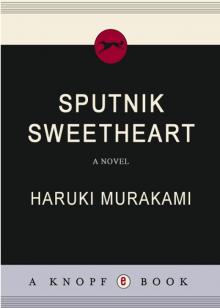 Sputnik Sweetheart
Sputnik Sweetheart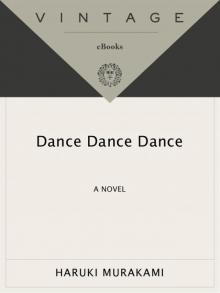 Dance Dance Dance
Dance Dance Dance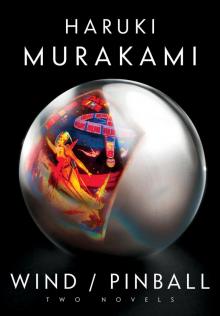 The Wind (1) and Up Bird Chronicle (2)
The Wind (1) and Up Bird Chronicle (2)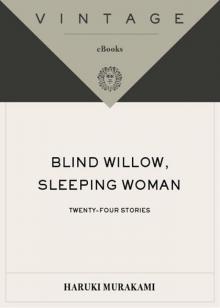 Blind Willow, Sleeping Woman
Blind Willow, Sleeping Woman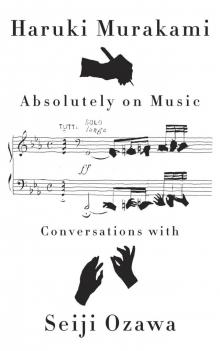 Absolutely on Music: Conversations With Seiji Ozawa
Absolutely on Music: Conversations With Seiji Ozawa Norwegian Wood
Norwegian Wood South of the Border, West of the Sun
South of the Border, West of the Sun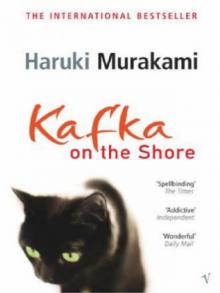 Kafka on the Shore
Kafka on the Shore Men Without Women
Men Without Women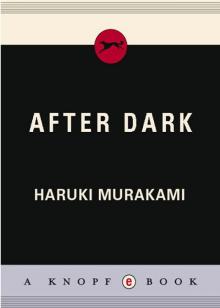 After Dark
After Dark Hard-Boiled Wonderland and the End of the World
Hard-Boiled Wonderland and the End of the World 1q84
1q84 The Wind-Up Bird Chronicle
The Wind-Up Bird Chronicle Underground: The Tokyo Gas Attack and the Japanese Psyche
Underground: The Tokyo Gas Attack and the Japanese Psyche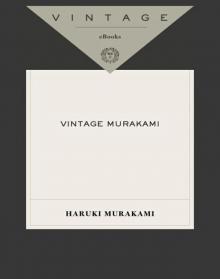 Vintage Murakami
Vintage Murakami The Elephant Vanishes: Stories
The Elephant Vanishes: Stories Colorless Tsukuru Tazaki and His Years of Pilgrimage
Colorless Tsukuru Tazaki and His Years of Pilgrimage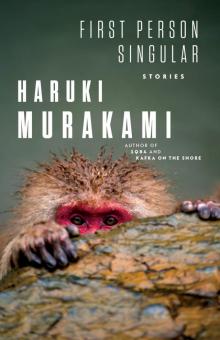 First Person Singular
First Person Singular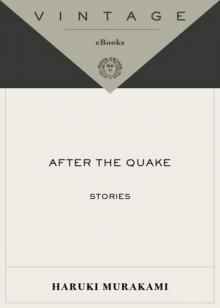 After the Quake
After the Quake A Wild Sheep Chase
A Wild Sheep Chase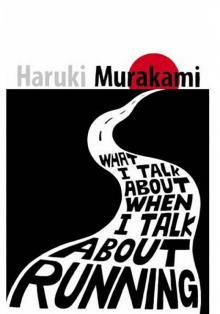 What I Talk About When I Talk About Running
What I Talk About When I Talk About Running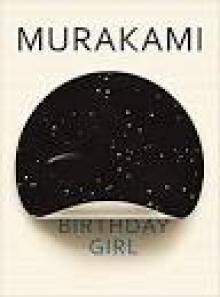 Birthday Girl
Birthday Girl The Elephant Vanishes
The Elephant Vanishes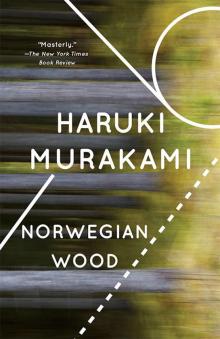 Norwegian Wood (Vintage International)
Norwegian Wood (Vintage International)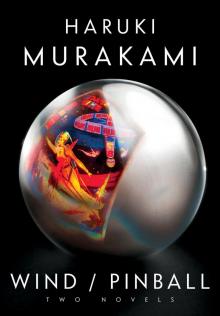 Wind/Pinball
Wind/Pinball Norwegian Wood Vol 1.
Norwegian Wood Vol 1. Underground
Underground Colorless Tsukuru Tazaki and His Years of Pilgrimage: A novel
Colorless Tsukuru Tazaki and His Years of Pilgrimage: A novel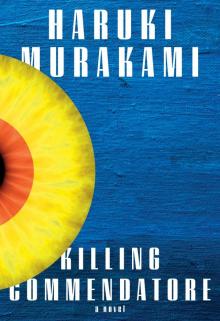 Killing Commendatore
Killing Commendatore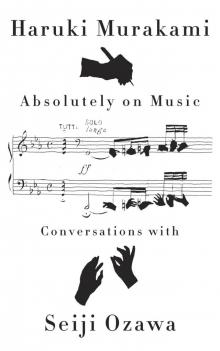 Absolutely on Music
Absolutely on Music